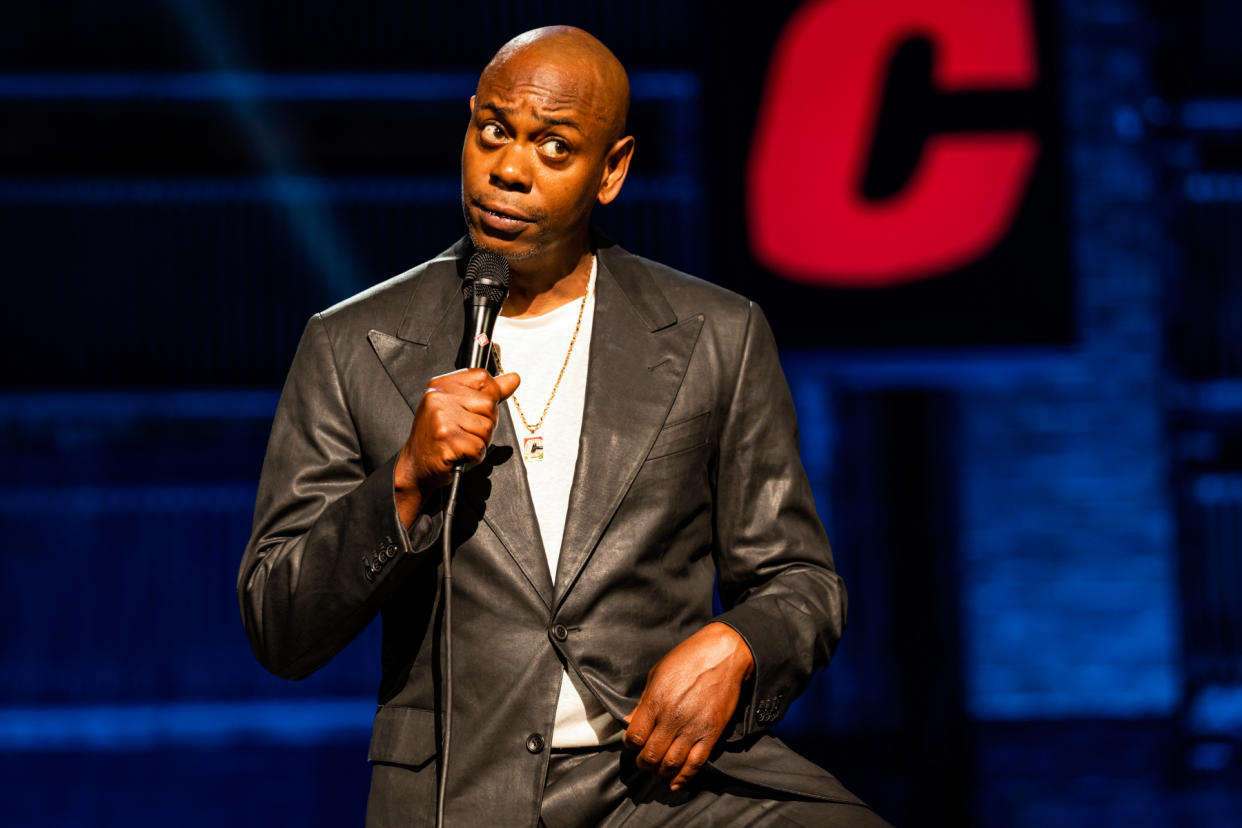Emmys Ready to Honor Another Dave Chappelle Special Filled With Transphobic Jokes

- Oops!Something went wrong.Please try again later.
Dave Chappelle’s controversial stand-up special The Closer, in which the comedian continued his recent habit of trotting out jokes at the expense of trans people and the LGBTQ community, earned the praise of the Academy of Television Arts and Sciences with an Emmy nomination for Outstanding Variety Special (Pre-Recorded).
The special premiered on Netflix last October and quickly garnered criticism for some of its content. Arguably the most inflammatory portion came towards the end when Chappelle called himself a TERF (a trans-exclusionary feminist), insisted “Gender is a fact,” and said Caitlyn Jenner winning a “Woman of the Year” prize was like BET giving Eminem a “N*gger of the Year” prize. After that, Chappelle compared trans peoples’ genitals to plant-based meat substitutes.
More from Rolling Stone
'Booked, Blessed and Busy': Lizzo Celebrates 'Big Grrrls' Emmy Nominations
Zendaya Makes Emmy History Once Again as Youngest Producing Nominee for 'Euphoria'
'Squid Game' Makes Emmy Awards History With Outstanding Drama, Acting Nominations
As a kind of counter-balance to his jokes punching down on an extremely marginalized and increasingly targeted community, Chappelle used other moments of The Closer to hedge his insistence that he’s not actually anti-trans. In one bit, he criticized North Carolina’s anti-trans bathroom bill, while he also spoke about his friendship with the late trans comedian Daphne Dorman, who died by suicide in 2019.
That Chappelle garnered an Emmy nomination for The Closer, however, probably shouldn’t be a surprise. The Television Academy has already fêted him for past specials that contained similarly incendiary material: In 2018 and 2020, he won the Emmy for Outstanding Variety Special (Pre-Recorded) for Equanimity and Sticks and Stones, respectively.
But while those jokes had become the most notorious, discussed, and criticized aspects of Chappelle’s act in recent years, The Closer seemed to be a tipping point. Several weeks after the special premiered on Netflix, employees at the streaming service staged a walkout, demanding Netflix acknowledge the detrimental effect material like Chappelle’s can have on the LGBTQ community while also pushing Netflix to release more LGBTQ content.
Netflix, for its part, stumbled through its response: CEO Ted Sarandos initially doubled-down on defending the special in a leaked memo to staff where he said, “content on screen doesn’t directly translate to real world harm.” He then apologized for that statement, saying, “Of course storytelling has real impact in the real world. I reiterate that because it’s why I work here, it’s why we do what we do. That impact can be hugely positive, and it can be quite negative. So, I would have been better in that communication.”
Meanwhile, Chappelle appeared to relish the controversy. A statement from the comedian’s rep said he “stands by his art” but was ostensibly open to discussing the issues with the special. Probably the closest thing to that kind of conversation took place about a month later during a contentious Q&A session with students at Chappelle’s former high school in D.C. The school was planning on naming its theater after the comedian, and as students expressed their concerns about the decision in light of his jokes, Chappelle responded by calling them “immature.”
This past June, Chappelle returned to the high school to address students again as the theater was officially christened the Theater for Artistic Freedom and Expression. “Rather than give this theater my name, I would like to give these students my message,” Chappelle said in a speech that is now serving as his latest Netflix release, What’s In a Name?
In What’s In a Name?, Chappelle also managed to offer some insight into the rather shallow reason he continues to use his comedy to punch down at the LGBTQ community: “The more you say I can’t say something, the more urgent it is for me to say it. It has nothing to do with what you’re saying I can’t say. It has everything to do with my right and my freedom of artistic expression. It’s worth protecting for me, and it’s worth protecting for everyone else who endeavors in our noble professions. These kids didn’t understand that they were instruments of oppression.”
Best of Rolling Stone

